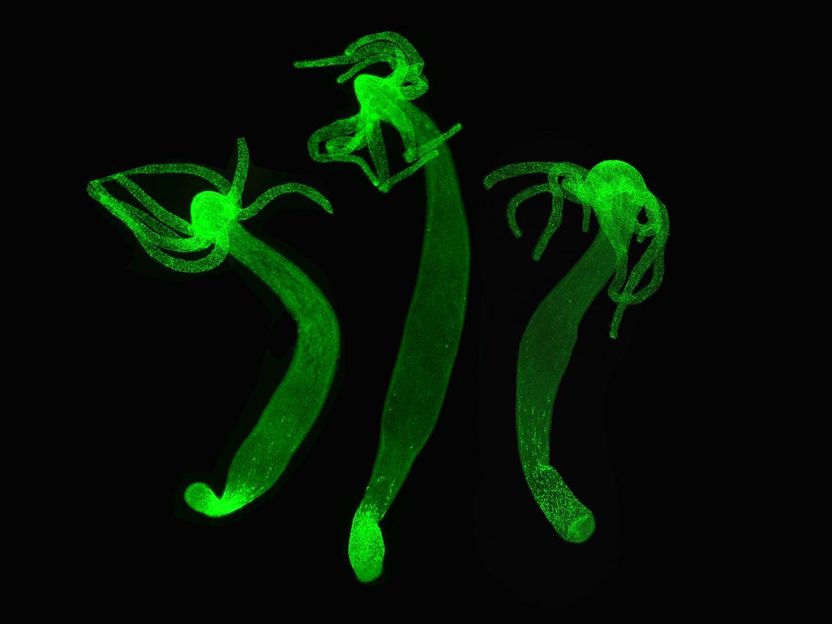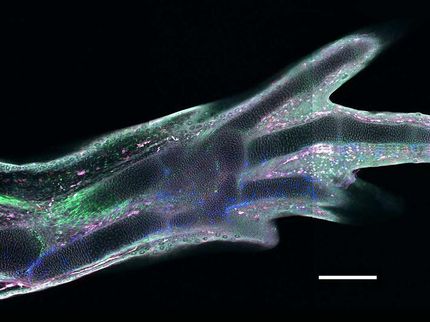Hydra can modify its genetic program
Champion of regeneration, the freshwater polyp Hydra is capable of reforming a complete individual from any fragment of its body. It is even able to remain alive when all its neurons have disappeared. Researcher the University of Geneva (UNIGE), Switzerland, have discovered how: cells of the epithelial type modify their genetic program by overexpressing a series of genes, among which some are involved in diverse nervous functions. Studying Hydra cellular plasticity may thus influence research in the context of neurodegenerative diseases. The results are published in Philosophical Transactions of the Royal Society.

This image shows the nervous system of about 1 cm-long Hydra revealed here with a fluorescent green marker.
© Brigitte Galliot
The freshwater Hydra is endowed with an extraordinary power of regeneration, discovered by the Swiss naturalist Abraham Trembley more than 250 years ago. The group of Brigitte Galliot, professor at the Department of Genetics and Evolution of the Faculty of Science of UNIGE, has studied the stem cells functioning and cellular plasticity of the polyp: "its nervous system regulates in particular contraction bursts, feeding behavior, moving or swimming. If the stem cells responsible for its renewal are depleted, the Hydra can still develop, even when all its neurons have disappeared. We wanted to understand how this is possible."
Enhancing other cells' sensing ability
The researchers compared gene expression at various positions along the body axis in polyps devoid or not of their nervous stem cells. They observed a modification of the genetic program in animals depleted of these cells: «we identified 25 overexpressed genes in epithelial cells, the cells forming the Hydra's coating tissues. Some of these genes are involved in diverse nervous functions, such as neurogenesis or neurotransmission», says Yvan Wenger, co-first author of the article.
"Epithelial cells do not possess typical neuronal functions. However, Hydra's loss of neurogenesis induces epithelial cells to modify their genetic program accordingly, indicating that they are ready to assume some of these functions. These "naturally" genetically modified epithelial cells are thus likely to enhance their sensitivity and response to environmental signals, to partially compensate for the lack of nervous system", explains Wanda Buzgariu, co-first author of the article. The detail of these new functions remains to be discovered, as well as how epithelial cells proceed to overexpress these genes and thus adapt their genetic program.
Cellular plasticity maintains youth
Studying Hydra's cellular plasticity may be relevant in the context of neurodegenerative diseases. Indeed, some of the genes identified in this animal play an important role in cellular reprogramming or in neurogenesis in mammals. The researchers therefore wonder: would it be possible to restore sensing or secretion functions from other cell types, when some neurons degenerate?
This study also allows to go back to the origins of nervous systems. Epithelial cells most probably preceded nerve cells, performing some of their functions, although in a much slower way. "The loss of neurogenesis in Hydra may provide an opportunity to observe a reverse evolutive process, because it sheds light on a repressed ancestral genetic toolkit. An atavism of epithelial cells, when they most probably also possessed proto-neuronal functions", concludes Brigitte Galliot.
Most read news
Other news from the department science

Get the life science industry in your inbox
By submitting this form you agree that LUMITOS AG will send you the newsletter(s) selected above by email. Your data will not be passed on to third parties. Your data will be stored and processed in accordance with our data protection regulations. LUMITOS may contact you by email for the purpose of advertising or market and opinion surveys. You can revoke your consent at any time without giving reasons to LUMITOS AG, Ernst-Augustin-Str. 2, 12489 Berlin, Germany or by e-mail at revoke@lumitos.com with effect for the future. In addition, each email contains a link to unsubscribe from the corresponding newsletter.
Most read news
More news from our other portals
Last viewed contents
Carl_Wedl
Which implementation strategy is right for bio-based chemicals? - Drop-in, smart drop-in and dedicated ones?
Parsing the genome of a deadly brain tumor
Category:EC_3.2.1

Lambda Laboratory Instruments - Zürich, Switzerland



















































